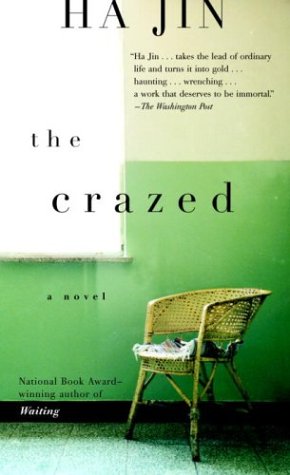Ha Jin’s new book, The Crazed, addresses a wide range of philosophical, moral, political, and historical issues, while maintaining a tight plot, lyrical style, and convincing, engaging characters. Jin uses the narration of a confused, flawed, but deeply curious student, listening at the sickbed of his mentor, to paint a broad picture of the personal and political tensions in China just before Tiananmen Square. Though The Crazed is heavy on ideas and literary allusions, it is never tiresome or pretentious. Jin’s spare, direct prose, evocative details, and psychological insight make the book move with incredible speed.
The Crazed is the story of Jian, a graduate student in literature at a provincial Chinese university. His mentor and future father-in-law, Mr. Yang, has a sudden stroke, and Jian is assigned to care for him. Alternately rational and delirious, Mr. Yang reveals inner torment and rage that Jian had never imagined the mild-mannered teacher to possess. Faced with Mr. Yang’s increasingly bitter diatribes against academia, Jian is forced to reconsider his conviction that a career in the university is the highest possible calling, and that devotion (perhaps even submission) to his ambitious girlfriend, Meimei, is his only romantic option. As he questions his diligent study of Chinese poetry, and his single-minded pursuit of a comfortable life with Meimei, Jian is swept up in the Tiananmen Square riots. He cuts all ties, starts a new life, and ponders a lone swim to Hong Kong.
Jin’s prose seduces the American reader with its references to classical Chinese literature, and its fresh phrasing and imagery. Jin enters fully into the psyches of the characters, whose attitudes toward life, family, work, and the state are in many ways unfamiliar to Americans. Apart from any cultural considerations, however, Jin’s style is beautiful and original. Jian’s narration is both pleasurable and loaded with psychological significance. A question like, “Why not put a period to the endless sentence of suffering?” is a gracefully ironic way of expressing Jian’s pedantic approach to the painful existential dilemmas posed by his teacher’s ravings. In another passage, Mr. Yang, persecuted by Communism and academia alike, says, “I’m only afraid I’m not worthy of my own suffering,” and Jian remarks, “His assertion made my gums itch;” Jian’s anxious responses to Mr. Yang range from the trivial to the coldly academic. Jin masterfully illustrates how Jian, like Mr. Yang before him, hides behind intellectualism, political fervor, and cynicism to avoid confronting the irreconcilable conflicts between desire and duty in 1989 China.
In its early chapters, the book seems to be about a fairly simple set of opposites: sanity vs. insanity, duty vs. desire, the robotic world of labor vs. the imaginative world of literature, family obligations vs. true love. However, as Jian probes the world around him, it becomes clear that it is ridiculous to definitively privilege one value over another, and that the divisions between categories are so permeable and fluid that it is almost impossible to believe in them.
The most obvious example of this theme is the questionable nature of Mr. Yang’s insanity. Though most characters discount him as insane, unwilling to listen to ravings that make his entire life seem like a lie, he has many moments of lucidity. Has he simply, sanely decided to stop wearing the mask demanded of him by family, career, and government? Or has he really lost his mind?
Insanity can be a way of escaping society’s oppression and constraints, and it often seems that this is what Mr. Yang has done. However, Jian’s roommate also jokes that “China was a paradise for idiots, who were well treated because they incurred no jealousy, posed no threat to anyone, and made no trouble for the authorities—they were model citizens through and through. Indeed, most of the retarded and the demented were taken care of by the state.” In fact, one of Mr. Yang’s deliriums consists of fanatical, outdated expressions of devotion to the government that humiliated and physically abused him. Is Mr. Yang’s illness a form of rebellion or submission? Jian’s perplexed and increasingly tormented response to the dilemmas presented by Mr. Yang leaves him with no option but to make a desperate attempt to flea China and abandon the system that has given him such disturbing non-choices.
Jin partially loses control of his narrative toward the end, when the sudden burst of action, and Jian’s newfound political involvement, make the book feel too much like a documentary. Some of the subtlety and originality are lost. But the book remains fascinating and enjoyable, full of psychological acuity and profound observations about the interplay between the individual and the state.

